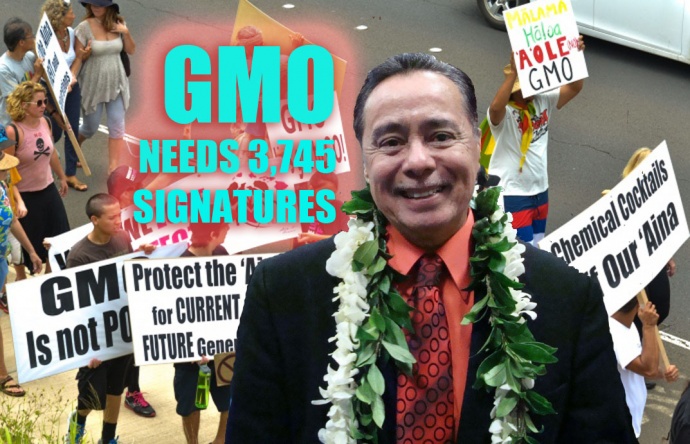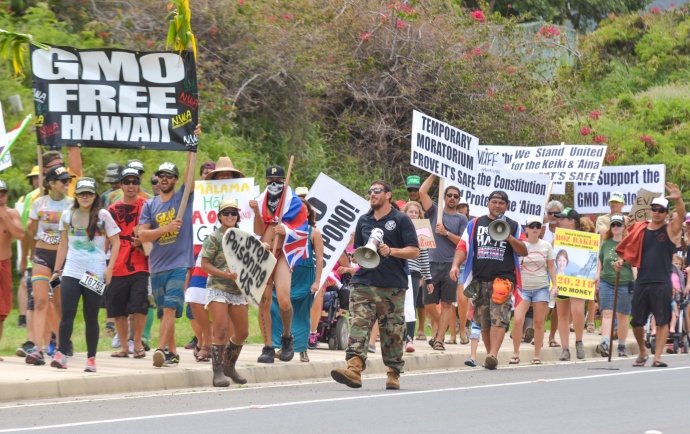Anti-GMO Group Needs 4K More Signatures to Get on Maui Ballot

The SHAKA Movement’s GMO Petition still needs 3,745 more signatures in the next 20 days in order to be included in the November ballot. Maui Now Graphic.
By Wendy Osher
A petition seeking a moratorium on the cultivation of genetically-engineered organisms or GMOs in Maui County is thousands of signatures shy of the amount required to be placed on the November ballot.
County Clerk Danny Mateo says a review of the petition shows 9,768 signatures were submitted, but less than half of that, or 4,720 of those signatures were deemed valid.
According to Mateo, a total of 5,048 signatures have been deemed invalid due to a variety of issues including duplicate signatures, insufficient or incorrect information provided, or illegible handwriting.
Mateo says the SHAKA Movement needs 3,745 more valid signatures in order to be placed on the ballot, and now has 20 days to submit supplemental signatures to the Office of the County Clerk in order for the petition to move forward in the Charter-mandated process.

More than 1,000 marchers participated in the anti-GMO event on March 30, 2014. File photo by Rodney S. Yap.
“Our office has carefully and diligently reviewed each line of the petition to ensure a thorough and fair review for all sides of the issue,” said Mateo in a county issued press release. “Our office looks forward in assisting the public utilize their rights as citizens of Maui County. We will continue to provide fair and unbiased assistance on all issues presented to us,” he said.
Mateo noted that the ratio between valid and invalid signatures is “fairly consistent with previous initiative petitions made in other counties,” including two Hawaii County petitions in 2006 and 2008 where an estimated 45% of signatures were deemed valid in each year. The Maui petition garnered an estimated 48% valid signatures.
When the SHAKA Movement submitted the initiative petition on April 7, Mark Sheehan PhD, one of five residents who started the petition, said the group had an additional 1,500 petition sheets that have yet to be notarized, and the group was still working to gather more signatures as a buffer to ensure that the group has the required 8,465 valid signatures to qualify for inclusion on the November ballot.
At the time, Sheehan said the action has become necessary because of the thousands of dollars in campaign contributions to Maui legislators from Monsanto and chemical corporations. He also said a critical factor for petition backers is their belief that, “a wide range of illnesses — childhood cancers, miscarriages, birth defects, ADD, ADHD, allergies, asthma, and more — are related to the contamination of the environment from massive use of pesticides.”
Representatives from Monsanto Hawaiʻi meantime responded to the petition at the time calling it “a terrible initiative,” “unnecessary,” and “meaningless,” with claims that biotech crops are safe and protect crops threatened by disease.
Dawn Bicoy, community affairs manager for Monsanto Molokaʻi issued a statement saying the company will be mounting “an aggressive campaign against this initiative,” saying it would “devastate our county’s fragile agricultural economy.”
Sheehan’s argument countered that claim saying, “you only have to dig a little bit to understand that GMOs are living organisms that stay alive in your gut; gut bacteria accounts for 70% of your immune system.”
About 200 Monsanto employees on Maui and 140 on Molokaʻi held signs during a rally in April to demonstrate support for Hawaiʻi’s seed industry; while petition supporters joined in an anti-GMO rally held on March 30 in Kahului that drew more than 1,000 participants.












